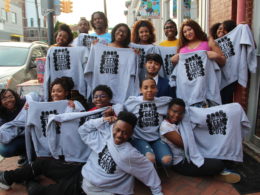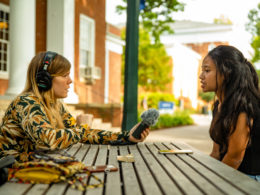Note: We recommend to our readers that they read this interview in order. To find the first part, click here.
When we last left off, Philip Deng was describing how he transformed a hack to write grants faster and easier into a fully-functioning platform that connects grant seekers with grant experts.
This is actually the first I’ve heard about Bubble. Changing gears a little bit. How did you get from that initial software to the company you’ve built today?
The biggest moment of change for Grantable was meeting my cofounder, Robert [Lee]. He is a phenomenally talented software engineer. The big shift was that I was doing a lot with Bubble, and I think it impressed Robert. He could see that I understood the concepts that are helpful in working with a technical person.
We actually didn’t set out to work together. We met at the 1717 Innovation Center in downtown Richmond, and we would just kind of catch up once in a while. I would show him what I was working on, and he’d show me some of his projects.

Soon after, I made a pivot. When I tested the grant writing software, I realized that people who write a ton of grants, such as professional grant writers, were really grabbing onto the tool and understanding its utility. However, nonprofit executive directors that aren’t doing a lot of volume, and have a million things on their plates didn’t have as much time to set up the library and get the value out of the tool. What I realized was the freelancers and the executive directors were having a really tough time finding each other. I decided that Grantable would become the marketplace that it is. That grant writing tool I mentioned is now on our roadmap to add on later as a feature of the marketplace.
Right now, what we want to do is connect individuals who can help one another and then quickly give them tools on the platform to make grant seeking more and more efficient. That’s how that transpired, but because of Robert the website is now built with industry-best practices as far as software development is concerned.
Can you explain how Grantable is an evolution of your original tool?
You can come up with a really cool idea for a technology that just solves a problem. When you bring it to the real world, sometimes it’s not actually the tech that should solve the problem, but if you can use technology to connect problem-solvers, that is so powerful. So, the people out there who are struggling with grant seeking, they don’t necessarily need a tool. What they need is a better way to access a community of helpers. That’s been a big part of our journey and development.
What kind of challenges have you run into in that process? On the flip side, what has been the most rewarding aspect of creating the platform?
The scariest scenario when you put something out into the world is having nobody stop and connect with it. We all have so much noise coming in through our screens, and you don’t want to add to the noise, but at the same time, you’re reaching out and want people to somehow realize that you are genuinely trying to work with them and make this process a little bit better for everybody.
I can’t tell you that feeling when you see a new person, either answer a message or reply to an email or create a profile, especially if you don’t know where they are. The best is when it’s a stranger that finds your creation and connects with it. That’s an amazing feeling.
The only thing that tops that is for about a month, all we had was the expert side on Grantable. We were trying to get people on the platform, so that grant applicants would have experts to browse through. Now that both sides are open, we really want some of these grant applicants to message experts and start working together. So, it’s super exciting.
When we add new grant experts, we ask them for a 30-minute call just to kind of learn about who they are and what their background is. A lot of them have taught us things. One thing in particular is that there are different regulations in every state that govern fundraising professionals. We’re starting to figure out how we can embed some sort of regulatory compliance into our platform, so that it’s easier for nonprofits or companies in any state to work with freelancers in any state.
Tell me about some of the local nonprofits or individuals that are shaping your work.
I just recently had the honor of chatting with Lea Whitehurst-Gibson of Virginia Community Voice. She’s an incredible community leader and organizer. Her work embodies a lot of why I got into the nonprofit sector in the first place. What I wanted to understand from her perspective, as a person who’s worked and lived here for 16 years is how is the Richmond and even greater Virginia nonprofit community organized and what is its history?
We’re just in the very early phases of reaching out and listening and learning about how the community flows and operates. We’ve had a chance to speak with some of the local foundations in town as well. Additionally, we’re just starting to talk about putting together an in person event, probably a few months from now, as those things become easier to do. It’s part of our goal of building a company that anybody around the world can plug into.
We talked about why you moved to Richmond earlier, but what makes this city different? Why is it the right home for your company?
Richmond is on the move for sure. I don’t think any sector is going to be untouched by that. You see the businesses and people moving here and of course all the nonprofits, too. There’s just a tangible energy flowing through this community. Grantable is a part of that and we want to serve that.
Is there anything you think the average person might not realize about Grantable? Can you describe what it has to offer?
Grant writing obscures a lot of the other services that these people do. That’s why we call them grant experts and not just grant writers. There are folks that do readiness coaching and review grants. They will prospect to help you find new grant opportunities. What we’re trying to do is really split out the writing aspect from all the other ways that these people can help organizations in a very targeted manner. Ultimately, we want to become synonymous with if you are going after grants, then do it on Grantable.
Looking at the future, do you and Robert plan to keep Grantable here in Virginia? Has the nonprofit community here been welcoming?
We have no plans to leave. Robert is from Fredericksburg, yet he’s lived in a bunch of the top tech cities in the U.S. And he came back to Richmond because there’s something special about this place that drew him back. As far as the startup ecosystem, I think it goes back to where we began this conversation. Anitha and I arrived in a place where we knew no one during a global pandemic and somehow I was able to start this company. It wasn’t an accident: It was Idea Factory and Lighthouse Labs offering support. We’ve even gotten mentorship from Capital One and CarMax. The private sector is really plugged into this. Plus, there’s a group of mentors that are really giving of their time and their expertise. That’s how I formed my community. Most of my new friends here in Richmond, other than neighbors, have come through this startup process. There’s a lot of optimism, energy and intention being put into helping cool businesses get going. We’ve been big beneficiaries of that.
But it’s important to remember that this private company, Grantable, exists because of amazing nonprofits.
– Philip Deng
One thing I’ll add that I’ve encountered for my whole career, is that there’s kind of this stereotype that nonprofits are not as effective as private sector companies. But it’s important to remember that this private company, Grantable, exists because of amazing nonprofits. The people in these organizations work under the same constraints that all nonprofits do and they’re incredibly talented, hardworking, smart and dedicated. They are literally helping to give birth to private companies that are going on to raise millions of dollars and touch millions of people’s lives. It’s really cool. It creates a positive cycle.
To support Grantable and use the platform, visit its website here. You can also follow the company on Facebook and Twitter.










